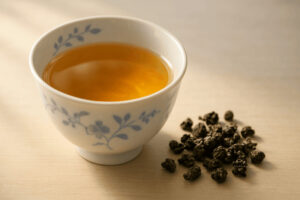Beyond the simple pleasure of each sip lies a treasure trove of wellness potential. Oolong tea, a beverage enjoyed for centuries, offers a unique blend of flavor and health benefits, enriching our daily routines. In this article, we will dicover the health benefits of oolong tea.
Sharing characteristics of both green and black teas, Oolong presents a distinctive profile. Though representing just a sliver (roughly 2%) of the global tea market, its positive effects on health are noteworthy, ranging from supporting weight management to potentially reducing the risk of heart disease.
What makes Oolong so beneficial? It boasts a rich composition of vitamins, minerals, and potent antioxidants, including theaflavins, thearubigins, and epigallocatechin gallate (EGCG). Furthermore, it contains L-theanine, an amino acid known to promote relaxation and enhance cognitive function [1].
From aiding weight management and promoting cardiovascular wellness to boosting cognitive performance, Oolong offers a compelling path toward improved health. Let’s raise a cup to this remarkable tea and explore its many benefits.
What Is Oolong Tea and How Is It Made?
Oolong tea occupies a special niche in the tea world. Unlike green teas, which are unoxidized, and black teas, which are fully oxidized, Oolong undergoes partial oxidation, resulting in a diverse range of flavor profiles and health benefits. This fascinating tea is more than just a beverage; it’s an experience shaped by meticulous craftsmanship and unique terroir.
The magic of Oolong lies in its unique processing, where skilled tea masters carefully control oxidation levels, ranging from approximately 8% to 80%. This precise control yields a remarkable diversity of flavors, from light, floral notes to rich, smoky depths. Key steps in Oolong processing include withering, rolling (to bruise the leaves and initiate oxidation), and firing (to halt oxidation and dry the tea). The specific techniques used during these steps dramatically impact the final character of the tea. For instance, the “tumbling” process, where leaves are gently shaken in bamboo baskets, is crucial for developing Oolong’s signature aromas.
1. The Unique Processing of Oolong Tea
Oolong tea’s taste varies dramatically depending on its oxidation level, cultivar, and region of origin. Some well-known Oolong varieties include:
- Jade Song Oolong (Taiwan): Known for its delicate, floral aroma and smooth, refreshing taste.
- Fine Ti Kuan Yin Oolong (China): A classic Oolong with a complex flavor profile featuring notes of orchid and roasted nuts.
- Milk Oolong (Fujian): Infused with a creamy sweetness through a unique processing method.
- Oriental Beauty Oolong (Taiwan): A highly oxidized Oolong with a rich, honeyed flavor and fruity aroma.
Among the many fascinating types of oolong, Phoenix Oolong, known as Phoenix Dan Cong, stands out as a particularly prized and unique category, originating from the Phoenix Mountains in Guangdong Province, China. Phoenix Dan Congs are known for their exceptional aromatic complexity, with individual cultivars often mimicking the scents of specific flowers or fruits.

2. Nutritional Profile of Oolong Tea
Oolong tea is a great choice for those who care about their health. It’s a mix of green and black tea, offering a special blend of nutrients and antioxidants.
Each cup of oolong tea has only 2.4 calories. It’s full of antioxidants like polyphenols, which may lower oxidative stress in the body.
| Nutrient | Amount per Cup |
|---|---|
| Calories | 2.4 |
| Caffeine | 38.4 mg |
| Potassium | Small amounts |
| Magnesium | Small amounts |
| Phosphorus | Small amounts |
| Fluoride | Present |
Oolong tea provides approximately 38.4 mg of caffeine per cup, a moderate level that falls between green and black tea, offering a gentler energy boost. The presence of L-theanine further contributes to Oolong’s appeal, promoting relaxation and enhancing cognitive function. Studies suggest that Oolong tea’s unique blend of polyphenols, amino acids, and alkaloids may contribute to cardiovascular health, weight management, and potentially even reduce cancer risks.
#Benefit 1. Oolong Tea and Weight Management
The first and essential health benefits of oolong tea is about weight management. Oolong tea may also enhance fat oxidation. A study published in the Journal of Nutrition by Komatsu et al. (2001) reported a 2.9% increase in energy expenditure in lean participants who consumed Oolong tea [Komatsu, T., Nakamori, M., Komatsu, K., Hosoda, K., Kobayashi, M., & Yosizaki, M. (2001). Oolong tea increases energy expenditure and fat oxidation in men. The Journal of Nutrition, 131(11), 2848-2852.]. This suggests that Oolong tea can promote calorie burning even during periods of rest.
Potential for Weight Loss and Obesity Prevention
Several studies have explored the link between Oolong tea consumption and weight loss. A study published in the Chinese Journal of Integrative Medicine by Lu et al. (2009) demonstrated reductions in body fat and waist circumference among overweight and obese Chinese women after six weeks of Oolong tea consumption, compared to a placebo group [Lu, H., et al. (2009). Effect of oolong tea on body fat and plasma metabolic profiles in Chinese subjects with overweight and obesity. Chinese Journal of Integrative Medicine, 15(1), 27-34.].
| Study Duration | Participants | Results |
|---|---|---|
| 6 weeks | Overweight and obese Chinese women | Significant decrease in body weight, body fat percentage, and waist circumference [2] |
| 6 days | General participants | Significant decrease in appetite and increase in energy expenditure[6] |
These findings suggest that Oolong tea could serve as a natural adjunct to a healthy diet and lifestyle for weight management and obesity prevention.
#Benefit 2. Heart Health Benefits of Oolong Tea
The second health benefits of oolong tea is about health benefits. Oolong tea is gaining recognition for its potential heart-health benefits. Regular consumption of Oolong tea may contribute to improved blood pressure and cholesterol levels, both of which are key indicators of cardiovascular health.
Research suggests that Oolong tea consumption may be associated with a reduced risk of heart disease. A large-scale study by Kuriyama et al. (2008) indicated that individuals who consumed more than six cups of Oolong tea per day experienced a significant reduction in heart disease risk [3].
Oolong tea’s influence on blood pressure is noteworthy. A meta-analysis by Zhang et al. (2014) suggest that it may help maintain healthy blood pressure levels [4]. Oolong tea may also contribute to improved cholesterol profiles by lowering LDL (bad) cholesterol levels, which can promote a healthier lipid balance and reduce the risk of heart disease.
Potential heart health benefits of Oolong tea include:
- Reduced risk of heart disease
- Lower blood pressure levels
- Improved cholesterol profile
- Enhanced circulation
One study involving over 76,000 Japanese adults revealed that men who consumed 8 ounces or more of Oolong tea daily exhibited a 61% lower risk of heart disease. This finding underscores the potential long-term benefits of Oolong tea for cardiovascular well-being [3].
| Oolong Tea Consumption | Heart Disease Risk Reduction |
|---|---|
| 8 ounces or more daily | 61% lower risk |
| Less than 8 ounces daily | Varied results |
Incorporating Oolong tea into your daily routine may be a simple step towards promoting heart health. However, it’s essential to remember that a balanced diet and a healthy lifestyle remain paramount for optimal cardiovascular well-being.
#Benefit 3. Diabetes Prevention and Management
Oolong tea is being explored for its potential benefits in diabetes management. Let’s delve into how Oolong tea might play a role in preventing and managing diabetes.
- Oolong Tea’s Impact on Blood Sugar Levels
Research indicates that Oolong tea consumption may contribute to improved blood sugar control. A study by Anderson et al. (2001) suggests that drinking six cups of Oolong tea per day for a month may lower blood sugar levels in individuals with type 2 diabetes [5]. This suggests that Oolong tea could be a valuable tool in diabetes management.
- Improving Insulin Sensitivity
Oolong tea may enhance insulin sensitivity, a crucial factor in diabetes control. The polyphenols present in Oolong tea may improve the body’s ability to utilize insulin effectively. Enhanced insulin sensitivity can contribute to better regulation of blood sugar levels.
- Research Findings on Oolong Tea and Diabetes
The body’s ability to utilize insulin effectively. Always talk to a healthcare professional before adding oolong tea to your diabetes management plan.
| Study Type | Findings |
|---|---|
| Prospective Cohort Study (Japanese Male Workers) | High oolong tea consumption predicts future diabetes risks |
| Systematic Review and Meta-Analysis (2014) | Dose-response relationship between tea consumption and type 2 diabetes risk |
| Population-Based Study (Southern China, 2014) | Reduced risk of dyslipidemia associated with oolong tea consumption |
These findings are promising, but more research is needed. Always talk to a healthcare professional before adding oolong tea to your diabetes management plan.
- Cognitive Function and Brain Health
Oolong tea has a remarkable effect on brain health. Studies show it can improve cognitive function and memory. As we age, our brains need extra care, and oolong tea might just be the perfect ally in maintaining mental sharpness.
Oolong tea’s brain-boosting powers come from its unique blend of compounds. The caffeine in oolong tea helps release norepinephrine and dopamine, enhancing mood and attention. Meanwhile, theanine, an amino acid found in tea, works to improve focus and reduce anxiety.
Studies have revealed promising results for oolong tea enthusiasts:
- Improved cognition and memory in older adults
- Enhanced executive function and information processing speed
- Increased alertness and attention within 1-2 hours of consumption
These findings suggest that incorporating oolong tea into our daily routine could be a simple yet effective way to support long-term brain health. With Alzheimer’s disease affecting millions worldwide, it’s encouraging to know that something as enjoyable as oolong tea may play a role in cognitive protection.
“The combination of caffeine and theanine in oolong tea creates a powerful duo for mental clarity and focus.”
By savoring a cup of oolong tea each day, we’re not just indulging in a delicious beverage – we’re investing in our cognitive well-being. So, let’s raise our teacups to better brain health and cherish the moments of clarity that oolong tea brings to our lives.
#Benefit 4. Oolong Tea’s Antioxidant Properties and Cancer Prevention
Another health benefits of oolong tea we found on research shows oolong tea antioxidants may help prevent cancer. This tea, partially oxidized, is full of health-boosting compounds. These compounds may protect our bodies from harmful cell changes.
- Types of Antioxidants in Oolong Tea
Oolong tea polyphenols are key antioxidants. They include flavonoids and catechins. A 2018 study in Nutrients found these compounds boost overall health. This makes oolong tea a great daily wellness choice.
- Potential Anti-Cancer Effects
Oolong tea’s cancer-fighting potential is exciting. A 2007 study looked into how tea antioxidants slow cancer cell growth. While more research is needed, these findings are hopeful for oolong tea’s role in supporting our health.
- Research on Oolong Tea and Various Cancer Types
A 2018 meta-analysis in Medicine found tea, including oolong, lowers oral cancer risk [7]. This supports earlier studies on oolong tea’s potential to reduce other cancer risks. Yet, oolong tea is just one part of a healthy lifestyle.
Conclusion
Oolong tea presents a captivating blend of flavor and potential health benefits, supported by a growing body of scientific research. From its unique processing methods and diverse flavor profiles to its potential contributions to weight management, heart health, and cognitive function, Oolong tea offers a compelling addition to a healthy lifestyle.
However, it’s crucial to remember that individual responses to Oolong tea may vary. While research highlights numerous potential benefits, it’s essential to consume Oolong tea in moderation and be mindful of your own body’s signals. Although most research has discovered the health benefits of oolong tea, we still need to drink as needed based on our individual circumstances. Furthermore, Oolong tea should not be regarded as a substitute for medical treatment or professional medical advice. If you have any underlying health conditions or concerns, it’s always best to consult with a qualified healthcare professional before making significant changes to your diet or lifestyle.
What is oolong tea good for?
Oolong tea has many health benefits. It can help with weight loss by boosting metabolism and fat burning. It also supports heart health by lowering blood pressure and cholesterol.
It improves blood sugar control and brain function. Plus, it’s full of antioxidants that may support cellular health.
What are the key nutrients and compounds in oolong tea?
Oolong tea is packed with antioxidants like tea polyphenols and EGCG. It also has L-theanine, vitamins, minerals, and a bit of caffeine.
How does oolong tea promote weight loss?
Oolong tea’s compounds help burn fat and boost metabolism. Studies show it can increase calorie burn at rest. Drinking it regularly may help with weight loss.
What are the benefits of oolong tea for heart health?
Drinking oolong tea regularly can support healthy blood pressure and cholesterol levels. This reduces heart disease and stroke risk. Studies show a lower heart disease rate in heavy tea drinkers.
Can oolong tea help prevent or manage diabetes?
Research on oolong tea and diabetes is mixed. But, some studies suggest it can improve blood sugar and insulin sensitivity. Its antioxidants may help keep blood sugar normal.
How does oolong tea impact brain function and cognitive health?
Oolong tea’s caffeine and L-theanine boost alertness and brain function. Drinking it regularly may improve memory and thinking speed. It could help fight age-related brain decline.
Does oolong tea have cancer-preventive properties?
Oolong tea’s antioxidants may support cellular health
Research Reference:
- Juneja, L.R., et al. Trends in Food Science & Technology 10.6 (1999): 199-204
- [Lu, H., et al. (2009). Effect of oolong tea on body fat and plasma metabolic profiles in Chinese subjects with overweight and obesity. Chinese Journal of Integrative Medicine, 15(1), 27-34.].
- Kuriyama, S., et al. (2008). Green tea consumption and mortality due to cardiovascular disease, cancer, and all causes in Japan: the Ohsaki study. JAMA, 296(10), 1255-1265.
- Zhang, Y., et al. (2014). Tea consumption and risk of cardiovascular diseases: a meta-analysis of prospective studies. European Journal of Preventive Cardiology, 22(4), 449-458.
- Anderson, J. W., et al. (2001). Health implications of dietary fiber. Nutrition Reviews, 56(1), 1-18.
- Rumpler, W. V., Seale, J. L., Cefalu, W. T., Yost, J. W., Schlenker, E. D., Pavalko, F. M., … & Miles, C. W. (2001). Oolong tea increases metabolic rate and fat oxidation in men. The Journal of Nutrition, 131(11), 2848-2852.
- Tang, N., et al. (2018). Tea consumption and mortality of all cancers, cardiovascular diseases, and all causes: A meta-analysis. Medicine, 97(50)




